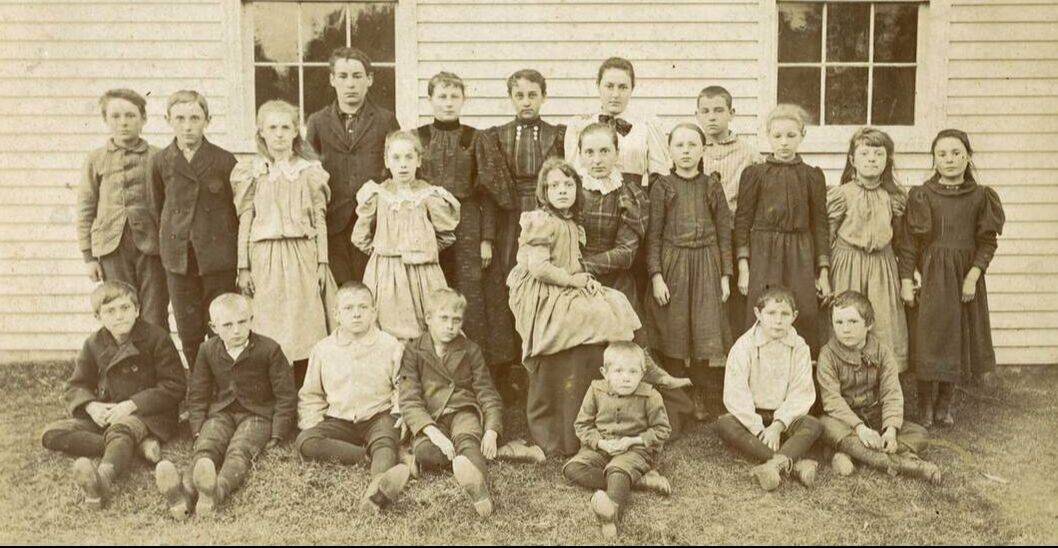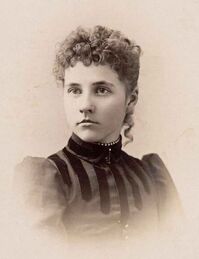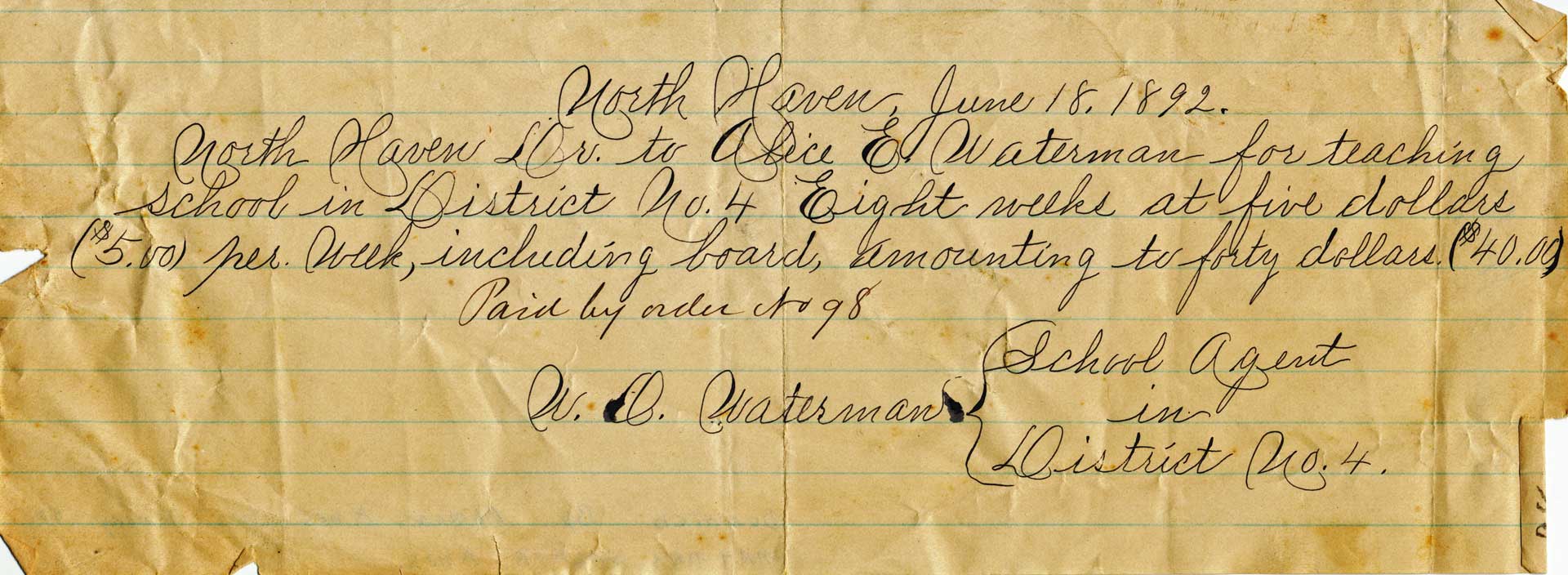TEACHER, TEACHER
He was well educated and his pupils made rapid progress under his tutorage. It is said that he was a great lover of rum and when any of the boys in his charge had advanced as far in mathematics as the “Rule of Three,” they were obliged to furnish him with a gallon of his favorite beverage.
A Brief Historical Sketch of the Town of Vinalhaven, Regarding Michael Bowen, the first hired teacher on North Haven
North Haven’s first school teacher, Michael Bowen, was hired in 1790. Bowen, who was from Ireland, came to the island from Massachusetts, and had served as a fife player in the Continental Army during the Revolutionary War. Bowen settled down on North Haven, where, in addition to teaching, he farmed land on the island’s northern shore. He taught for several years, alternating his time between schools on North Haven and Vinalhaven.
Throughout the 1800s, the majority of teachers in North Haven schools were young women, some as young as 14 or 15 when they began teaching, and many without a high school education. This was commonplace for rural schools throughout Maine and the United States.
A check up of teachers, as late as 1875, showed that almost half had never gone to school themselves beyond the eighth grade, and almost three-quarters had begun teaching before they were 18 years old.
Maine and Her People, Harold Clifford, 1960
Consistently, records show that female teachers received lower wages than male teachers. In addition, when school districts paid for teachers to board at an island home, they devoted less funds toward board for a female teacher than a male.
I always like children and I always wanted to do something with them and earn my living; and teaching seemed to be the one thing. There were two things open to women then: one thing was to be a nurse (which I knew I couldn’t do), and the other thing was to teach, which I thought I would love -- and I did.
Ida Wooster Dyer, Interview with Eliot Beveridge, circa 1980
A Brief Historical Sketch of the Town of Vinalhaven, Regarding Michael Bowen, the first hired teacher on North Haven
North Haven’s first school teacher, Michael Bowen, was hired in 1790. Bowen, who was from Ireland, came to the island from Massachusetts, and had served as a fife player in the Continental Army during the Revolutionary War. Bowen settled down on North Haven, where, in addition to teaching, he farmed land on the island’s northern shore. He taught for several years, alternating his time between schools on North Haven and Vinalhaven.
Throughout the 1800s, the majority of teachers in North Haven schools were young women, some as young as 14 or 15 when they began teaching, and many without a high school education. This was commonplace for rural schools throughout Maine and the United States.
A check up of teachers, as late as 1875, showed that almost half had never gone to school themselves beyond the eighth grade, and almost three-quarters had begun teaching before they were 18 years old.
Maine and Her People, Harold Clifford, 1960
Consistently, records show that female teachers received lower wages than male teachers. In addition, when school districts paid for teachers to board at an island home, they devoted less funds toward board for a female teacher than a male.
I always like children and I always wanted to do something with them and earn my living; and teaching seemed to be the one thing. There were two things open to women then: one thing was to be a nurse (which I knew I couldn’t do), and the other thing was to teach, which I thought I would love -- and I did.
Ida Wooster Dyer, Interview with Eliot Beveridge, circa 1980
Maine’s first teacher training college, widely known as a “Normal School” for instructing behavioral and societal “norms,” was established in 1864 in Farmington. In North Haven, the first island teacher with Normal School training was Simeon A. Lovejoy, a graduate of the Eastern State Normal School of Castine, Maine, hired to teach at the North Haven High School in 1888.
Originally, teachers were deemed certified by one of the island’s school district agents, although there were no agreed upon standards for certification.
In our country towns many teachers are not even examined, as the custom is to give certificates to all, “good, bad, or indifferent,” and many a teacher goes into the school room with but little education, and much less knowledge of the duties to be performed. Such instances have been far too numerous in this town, and part of our school money is practically thrown away every year. Can we afford it? Parents, I appeal to you on behalf of your children…Demand the best of teachers for your children and don’t be afraid to pay for them.
C.F. Brown, Supervisor of Schools, North Haven Town Report, 1891
By 1895, Maine established state certification and by 1913 the state required teachers to take a mandatory examination to receive certification. With teachers’ salaries averaging $5 per week during the late 1800s, coupled with North Haven’s isolated location, island schools struggled to attract and retain skilled teachers. Superintendents repeatedly called for more funds to be devoted toward instruction.
Good teachers are in great demand and command a good salary, and if we want them to teach our schools we must raise more money to pay them with…If we wish to have our schools on a level with the schools of other towns we must have more money to put them there. The times demand it.
S. A. Nutt, Superintendent of Schools, North Haven Town Report, 1902
Originally, teachers were deemed certified by one of the island’s school district agents, although there were no agreed upon standards for certification.
In our country towns many teachers are not even examined, as the custom is to give certificates to all, “good, bad, or indifferent,” and many a teacher goes into the school room with but little education, and much less knowledge of the duties to be performed. Such instances have been far too numerous in this town, and part of our school money is practically thrown away every year. Can we afford it? Parents, I appeal to you on behalf of your children…Demand the best of teachers for your children and don’t be afraid to pay for them.
C.F. Brown, Supervisor of Schools, North Haven Town Report, 1891
By 1895, Maine established state certification and by 1913 the state required teachers to take a mandatory examination to receive certification. With teachers’ salaries averaging $5 per week during the late 1800s, coupled with North Haven’s isolated location, island schools struggled to attract and retain skilled teachers. Superintendents repeatedly called for more funds to be devoted toward instruction.
Good teachers are in great demand and command a good salary, and if we want them to teach our schools we must raise more money to pay them with…If we wish to have our schools on a level with the schools of other towns we must have more money to put them there. The times demand it.
S. A. Nutt, Superintendent of Schools, North Haven Town Report, 1902
Through the decades, North Haven sought to attract and retain teachers who were not only skilled educators but could also navigate the uniqueness of island life and a small community.
One of the reasons we looked beyond the professional data appearing on a candidate’s resumé was that we were not only hiring a teacher, we were also inviting a new person into the community. It is important for a rural teacher to feel relatively comfortable with community values, to be open to joining the community, and to be personally committed to a rural way of life.
Schooling In Isolated Communities, Tom Gjelten, 1978
One of the reasons we looked beyond the professional data appearing on a candidate’s resumé was that we were not only hiring a teacher, we were also inviting a new person into the community. It is important for a rural teacher to feel relatively comfortable with community values, to be open to joining the community, and to be personally committed to a rural way of life.
Schooling In Isolated Communities, Tom Gjelten, 1978



